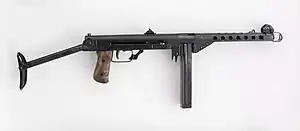| DUX submachine gun | |
|---|---|
 Finnish KP m/44 on which the DUX was based | |
| Type | Submachine gun |
| Place of origin | Spain |
| Service history | |
| Used by | Bundesgrenzschutz |
| Production history | |
| Manufacturer | Oviedo Military Arsenal |
| Variants | DUX-53, DUX-59 |
| Specifications | |
| Cartridge | 9×19mm Parabellum |
| Caliber | 9mm |
| Action | Blowback |
| Maximum firing range | 230 ft |
| Feed system | Detachable 20 or 36 round box magazine, or 71 round drum magazine |
| Sights | Iron |
The DUX-53 and DUX-59 were submachine guns manufactured at the Oviedo Arsenal in Spain. They were based directly on the design of the Finnish 9mm Model 44 submachine gun, which in turn was based on the Soviet PPS-43.
Users
 West Germany: Sold to the Bundesgrenzschutz.[1]
West Germany: Sold to the Bundesgrenzschutz.[1]
References
- ↑ Iannamico, Frank (February 2014). "The Soviet PPS-43 Submachine Gun". Small Arms Review. Archived from the original on September 24, 2023.
Another lesser known copy was the DUX 53 (Latin for leader) submachine gun manufactured in Spain. The DUX 53 was chambered for the 9mm Parabellum cartridge. The DUX 53 was an almost identical copy of the Finnish M/44, and used the same box and drum magazines. In 1954, the weapon was adopted by the West German Border Guards- the Bundesgrenzschutz BGS. The DUX 53 was followed by the DUX 59 model that was developed by Anschütz in Germany. The DUX 59 had a few changes and upgrades, most of which were copied from other designs. The recoil spring was changed to an enclosed telescoping configuration like that used in the German World War II MP40. The trigger frame of the DUX 59 was reinforced on the sides of the magazine well, preventing the use of the drum or duplex magazine. A sliding safety lever was relocated above the pistol grip on the left side, and the folding metal buttstock was reinforced. A new curved magazine was developed for improved feeding. The DUX 59 was under development for many years, but basically it was a World War II design. The weapon was evaluated, but not adopted by the German military.
- Ezell, Edward Clinton (1977). Small Arms of the World, 11th edition. Harrisburg, PA: Stackpole Books. ISBN 0-8117-1558-2
This article is issued from Wikipedia. The text is licensed under Creative Commons - Attribution - Sharealike. Additional terms may apply for the media files.